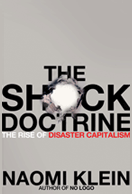The Shock Doctrine

Chileans Protest Government Attempts to Further Privatize Education
Reuters, Reuters, July 8, 2008
"Teachers and students want President Michelle Bachelet to withdraw an education bill from Congress under which an education superintendent would regulate government funds for public schools. Protesters say the bill does not address concerns that Chile's education system is being privatized, and they believe that the education of poorer students will suffer at ill-funded state schools as a result of the measure....
"In June, thousands of teachers and students protested against the bill, which has been passed by the lower house of congress. The senate has yet to vote on it. The bill would replace a law in place since the end of Augusto Pinochet's 1973-1990 dictatorship."
See Upside Down World for more analysis on the education bill and the protests.
U.S. Relies Heavily on Contractors to Fight Drug Trade
August Cole, Wall Street Journal, July 5, 2008
"During the more than five years that three Northrop Grumman Corp. employees were held hostage in Colombia, captured while on a Defense Department job, the U.S. steadily increased its use of contractors to help fight the drug trade in dangerous parts of the world. Although the biggest defense contractors have shown no interest in providing teams of armed security guards similar to those in Iraq from Blackwater Worldwide or DynCorp International, they are increasingly willing to operate close to danger.
"The U.S. spends hundreds of millions of dollars a year hiring pilots, mechanics, and military and police trainers to combat the drug trade in South American countries, as well as Afghanistan and other Central Asian states. Lockheed Martin Corp. also supports peacekeeping forces in Darfur."
World Bank Admits Biofuels Caused Food Crisis
Aditya Chakrabortty , Guardian, July 4, 2008
"Biofuels have forced global food prices up by 75% - far more than previously estimated - according to a confidential World Bank report obtained by the Guardian. The damning unpublished assessment is based on the most detailed analysis of the crisis so far, carried out by an internationally-respected economist at global financial body.
"The figure emphatically contradicts the US government’s claims that plant-derived fuels contribute less than 3% to food-price rises. It will add to pressure on governments in Washington and across Europe, which have turned to plant-derived fuels to reduce emissions of greenhouse gases and reduce their dependence on imported oil."
Scientists Say Formaldehyde in FEMA Trailers Is Due to Poor Construction and Lax Federal Regulation
Spencer S. Hsu, Washington Post, July 3, 2008
"High levels of formaldehyde found in trailers provided to Hurricane Katrina evacuees on the Gulf Coast probably resulted from cheap wood and poor ventilation in designs used by manufacturers under permissive government standards, federal scientists reported yesterday. An analysis by researchers for Lawrence Berkeley National Laboratory found that four Katrina trailers emitted the toxic chemical at levels four to 11 times as high as those found in typical U.S. homes. The study looked at both commercially available units and ones custom-built for the Federal Emergency Management Agency in 2005 and 2006.
"The new findings appear to confirm the role that manufacturers' practices and weak federal regulation played in the public health disaster after the August 2005 storm."
Company Markets Stun Bracelet to Department of Homeland Security
Jeffrey Denning, Washington Times, July 1, 2008
"A senior government official with the U.S. Department of Homeland Security (DHS) has expressed great interest in a so-called safety bracelet that would serve as a stun device, similar to that of a police Taser®. According to this promotional video found at the Lamperd Less Lethal, Inc. website, the bracelet would be worn by all airline passengers.
"This bracelet would:
• Take the place of an airline boarding pass
• Contain personal information about the traveler
• Be able to monitor the whereabouts of each passenger and his/her luggage
• Shock the wearer on command, completely immobilizing him/her for several minutes"
Pennsylvania Retakes Control of 6 Privatized Schools in Philadelphia
Keith B. Richburg, Washington Post, June 29, 2008
"Six years ago, the Philadelphia School District embarked on what was considered the country's boldest education privatization experiment, putting 38 schools under private management to see if the free market could educate children more efficiently than the government. If it worked, the plan seemed likely to become a model for other struggling urban school districts, such as Washington's, suffering from a lack of funding, decaying buildings and abysmal student test scores.
"This month, the experiment suffered a severe setback, as the state commission overseeing Philadelphia's schools voted to take back control of six of the privatized schools, while warning 20 others that they had a year to show progress or they, too, would revert to district control."
Gordon Brown Invokes Food Crisis and Pushes EU to Permit Genetically Modified Animal Feeds
Andrew Grice, Independent, June 20, 2008
"Gordon Brown is calling on the European Union to relax its rules on importing genetically modified animal feed in a further sign of the Government's willingness to embrace the controversial technology. Mr Brown believes GM crops are vital to the attempt to cut spiralling food prices....
"Ministers who support GM crops believe there are no convincing arguments against them. They want to turn the tables on environmental groups who campaigned successfully against widespread GM production in Britain during the last government review in 2004. Although there is no ban, the ministers want the rules changed in light of the food crisis, as no GM crops are currently being grown commercially in this country.
"At a two-day summit in Brussels which began last night, EU leaders were urged to "bite the bullet" and embrace GM products as a solution to rocketing food prices. The plea came from Jose Manuel Barroso, President of the European Commission. Several EU countries, led by France, are unconvinced that "Frankenstein foods" are safe.
"At the meeting, Mr Brown suggested allowing more GM animal food into the EU. The move may raise safety fears because contaminated feed was blamed for the outbreak in Britain of BSE in the 1990s."
Dow, Monsanto Move To Grow Crop Businesses
Melinda Peer, Forbes, June 19, 2008
"On Thursday, Monsanto agreed to acquire Marmot S.A., which operates Central America's leading corn seed company, giving it a distribution network to deliver new products to farmers in the region.Meanwhile, Dow AgroScience, the agricultural arm of Dow Chemical, exercised an option to license so-called zinc finger technology from Sangamo Biosciences for use in agricultural crops, industrial products and plant-based biopharmaceuticals....
"Although genetically modified crops aren't allowed in Central America, except for in Honduras, that could change as governments become increasingly concerned about global food supply. On May 29, the U.N.'s Food and Agriculture Organization called for a reconsideration of genetically-modified crops, which have been banned by most governments. Monsanto has made similar requests to regulators and doesn't want to waste any time setting up a distribution network if and when genetically altered crops are approved for planting."
Big Oil to Sign No-Bid Contracts in Iraq
Andrew E. Kramer, New York Times, June 19, 2008
"ExxonMobil, Shell, Total and BP — the original partners in the Iraq Petroleum Company — along with Chevron and a number of smaller oil companies, are in talks with Iraq's Oil Ministry for no-bid contracts to service Iraq's largest fields, according to ministry officials, oil company officials and an American diplomat.
"The deals, expected to be announced on June 30, lay the foundation for the first commercial work for the major companies in Iraq since the American invasion, and open a new and potentially lucrative country for their operations....
See also:
* "The Real Significance of the Oil Ministry's Bid Round," by Greg Muttitt at Carbonweb, July 1, 2008
* "Iraq to Award Oil Contracts to Foreign Firms," Agence France Presse, June 22, 2008
* "Big Oil Firms Ready to Sign Agreements With Iraq," Washington Post, June 20, 2008
BusinessWeek Questions if Astronomical Salaries for CEOs of US Oil Firms Due to Performance or High Oil Prices
Moira Herbst, BusinessWeek, June 17, 2008
"Energy chief executives got raises last year much bigger than in other industries. Was it pay for performance—or pay for high oil prices?....
"Executive compensation for the CEOs of the 12 largest U.S. oil outfits rose by 5.8% from 2006 to 2007, from a median of $14.6 million to a median of $15.4 million. That's more than four times the increase of compensation for S&P 500 CEOs, whose median increased by 1.3% from 2006 to 2007, or $8.7 million to $8.8 million....More striking than the rate of pay increases for executives is the size of bonuses. For U.S. companies studied, total bonuses increased by 71% year over year, from $2.1 million in 2006 to $3.5 million in 2007. Over the same period, bonuses for chief executives overall in the S&P 500 shrank 4.9%, from $1.93 million to $1.84 million....
"Equilar also analyzed compensation of top energy executives of non-U.S. companies. While making less than their American counterparts, these 13 executives saw their median compensation increase by 85.8% from 2006 to 2007, from $4.8 million in 2006 to $8.9 million in 2007."















